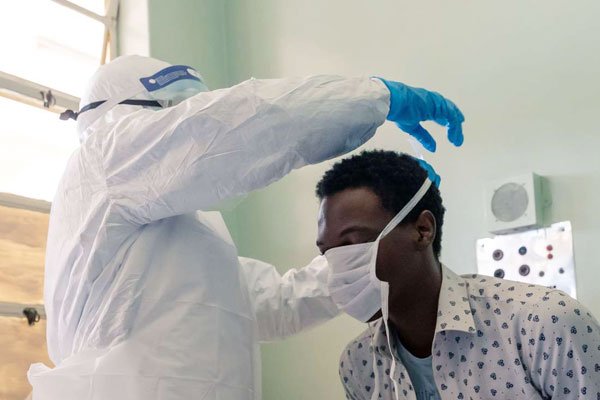
A medical staff member places a face mask on a mock patient at the Wilkins Infectious Diseases Hospital in Harare on March 11, 2020, as staff demonstrate their preparedness to treat Covid-19 coronavirus patients. Zimbabwe is withholding travel documents for thousands of returning nationals, following reports that some have escaped from isolation centres. PHOTO | JEKESAI NJIKIZANA | AFP
In Summary
- Returnees complained that they are forced to stay at the quarantine centres for too long without being tested for coronavirus.
- They also say the facilities are inhabitable and they do not have adequate food supplies.
- Government says it will ensure maximum security at isolation centres.
The government says this will ensure they remain in the centres and help stop the spread of the Covid-19 coronavirus.
Returnees complained that they are forced to stay at the quarantine centres for too long without being tested for coronavirus. They also say the facilities are inhabitable and they do not have adequate food supplies.
The government on Wednesday said it will ensure maximum security at the isolation centres.
“In order to curtail the prevalence of people absconding from quarantine centres, Cabinet agreed that identification or travel documents will be collected from returnees on arrival [and returned to them] at the end of the quarantine period,” Information minister Monica Mutsvangwa said.
Agnes Mahomva, the head of Zimbabwe’s Covid-19 response, said those escaping from quarantine centres have become a security concern.
“Every effort is being made to follow up on those who escape. If they are found guilty, they will be penalised accordingly,” Dr Mahomva said.
At the weekend, the government published 48 names of people who escaped from quarantine centres.
The southern African country has recorded 314 Covid-19 cases since it reported its first case in March and the majority of them are citizens returning from countries such as the United Kingdom, South Africa, Botswana and Mozambique.
All returnees are required to check into isolation centres for 21 days before they are allowed to join their families.
Thousands of Zimbabweans around the world are expected to return home after losing their sources of income abroad. More than 5,000 citizens have returned home in recent weeks.
The International Organisation for Migration (IOM) said that between April and May its centres at Zimbabwe’s points of entry had handled 5,400 immigrants arriving from Zambia, Malawi, Democratic Republic of Congo, Botswana, Mozambique and South Africa.
IOM said the influx of immigrants is straining Zimbabwe’s already overstretched social and health services.
Post published in: Featured

